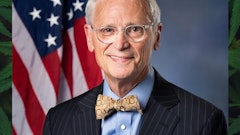
The Oregon Court of Appeals has halted Gov. Kate Brown’s ban on flavored tobacco vape products, although the ruling does not apply to cannabis products.
The Oct. 17 ruling placed a temporary stay on the ban of tobacco-based vaping products, which are sold under the oversight of the Oregon Health Authority, but leaves the ban in place on cannabis vaping products, which are regulated by the Oregon Liquor Control Commission, according to an Oregon Live report.
Vape businesses and an industry organization called the Vapor Technology Association challenged the ban Oct. 16, arguing that it would cause them to “suffer severe and irreparable harm long before the [ban] could be subjected to full judicial review,” Oregon Live reported.
“Petitioners assert, as a result of the rule, they, along with number other similarly situated businesses, will be forced to close within weeks,” Appellate Commissioner Theresa Kidd wrote in her ruling.
Smokeless Solutions and Vape Crusaders said that the ban would force their businesses to close within two weeks, according to Oregon Live, and argued that regulators do not have the legal standing to enforce the ban.
In response, the Oregon Health Authority issued a statement saying that the ban is “an evidence-based strategy to prevent youth, as well as adults attracted to flavors, from becoming exposed to the health risks from vaping products and from becoming addicted to nicotine,” Oregon Live reported. Although the agency will temporarily suspend enforcement of the ban on tobacco vaping products, it will continue working on legislative proposals that would permanently ban flavored vapes, increase industry oversight and discourage Oregon residents from vaping, according to Oregon Live.
Brown issued an executive order Oct. 4 that announced the six-month ban on all flavored vaping products in the state in response to the growing number of vape-related lung disease cases and deaths across the country.
Similarly, Massachusetts Gov. Charlie Baker announced a four-month ban on all vape sales late last month. Earlier this week, Colorado regulators proposed rules to prohibit polyethylene glycol (PEG), vitamin E acetate and medium chain triglycerides (MCT oil) in cannabis concentrates or products that are meant to be inhaled. Washington also adopted emergency rules this week that require all cannabis licensees to disclose all compounds used to produce or added to inhaled concentrates and extracts, and retailers in the state are now required to post consumer warnings.

























